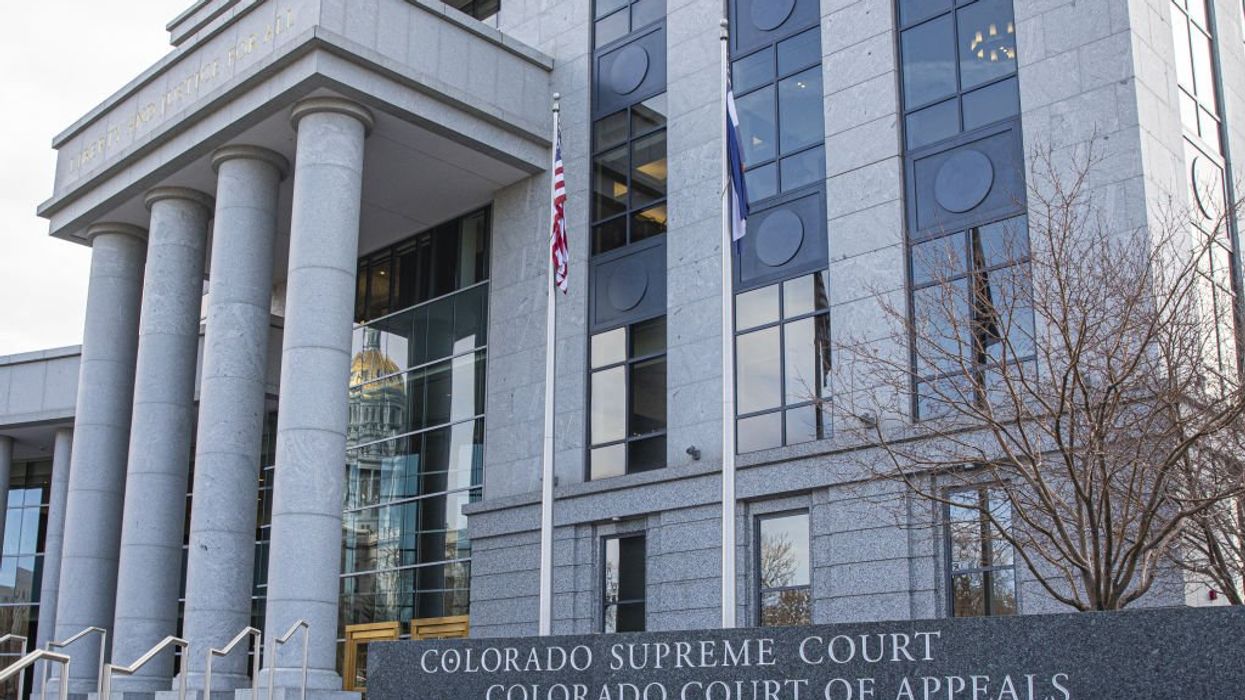
Bloomberg / Contributor via Getty Images

It remains an open question whether what happened on January 6, 2021, was really an 'insurrection' and whether Donald Trump’s speech incited the crowd. Happily, four judges in Colorado don’t have the last word.
The Colorado Supreme Court’s decision last week to disqualify Donald Trump from the Republican state presidential primary isn’t only about Trump. The case raises the question of whether voters will lose the fundamental right to choose their preferred candidate for president.
As the Colorado case now stands, the most damaging position for the voters is not to even be able to cast a vote for or against Trump and other candidates. Disenfranchising voters in this setting does not sit well now — nor will such a precedent sit well for potential future elections.
The controversy isn’t limited to Colorado. Several other states, including Alaska, California, Nevada, New Jersey, New Mexico, New York, Oregon, South Carolina, Texas, West Virginia, Wisconsin, Wyoming, Vermont, and Virginia are weighing the question as well. On the other hand, the Michigan Supreme Court on Wednesday rejected a lawsuit similar to Colorado’s and allowed Trump to remain on the ballot.
Ultimately, the U.S. Supreme Court will need to settle the question, which revolves around an interpretation of a relatively obscure section of the 14th Amendment.
The plaintiffs in the Colorado case argued that Trump should be disqualified as a candidate on the 2024 Republican presidential primary election ballot and any future election ballot because he is barred from public office under Section 3 of the 14th Amendment, which states:
No person shall be a Senator or Representative in Congress, or elector of President and Vice President, or hold any office, civil or military, under the United States, or under any State, who, having previously taken an oath, as a member of Congress, or as an officer of the United States, or as a member of any State legislature, or as an executive or judicial officer of any State, to support the Constitution of the United States, shall have engaged in insurrection or rebellion against the same, or given aid or comfort to the enemies thereof. But Congress may by a vote of two-thirds of each House, remove such disability.
So, did Trump violate the 14th Amendment? Is Section 3 even applicable to the presidency? And did the events at the Capitol on January 6, 2021, constitute an insurrection? Can the Colorado court decide this question of insurrection?
Yes, Trump challenged the 2020 election results. Speaking before tens of thousands of his supporters at the “Stop the Steal” rally in Washington, D.C., on January 6, Trump insisted that “we won in a landslide.” He urged his supporters to challenge Joe Biden’s victory and “fight like hell,” or “you’re not going to have a country anymore.”
The court found that members of the crowd began to move toward the Capitol Building even before Trump’s speech ended. By now, most people are aware of what happened next. Some unruly members of the crowd fought with police, broke windows, and entered the building. Thousands of others walked into the building unimpeded. Some even had police escorts. So, it remains an open question whether what happened at the Capitol on the afternoon of January 6 was really a riot or an “insurrection” and whether Trump’s speech incited the crowd into lawless action.
For four members of the Colorado Supreme Court, the answer was clear.
The court held that the state’s election code “allows the Electors to challenge President Trump’s status as a qualified candidate based on Section Three. Indeed, the Election Code provides the Electors their only viable means of litigating whether President Trump is disqualified from holding office under Section Three.”
What’s more, the court said, Congress did not need to pass legislation implementing the section’s disqualification provision because it was, in a sense, “self-executing.”
The judges also held that a lower court in the case was not wrong to conclude that the events of January 6 constituted an “insurrection” and that Trump engaged in that insurrection through his actions and words — words the court determined had incited the crowd to breach the Capitol and were therefore not protected under the First Amendment.
“The sum of these parts is this,” the justices concluded. “President Trump is disqualified from holding the office of President under Section Three; because he is disqualified, it would be a wrongful act under the Election Code for the Secretary to list him as a candidate on the presidential primary ballot.”
Three of the seven jurists — including Chief Justice Brian Boatright and Justices Carlos Samour and Maria Berkenkotter — dissented.
“I cannot agree with the majority that the chimeric proceedings below gave President Trump process commensurate to the interest of which he has been deprived,” Justice Samour wrote. “Nor did the proceedings below protect the interest Coloradans have in voting for a candidate of their choosing.”
“Of course,” he added, “if President Trump committed a heinous act worthy of disqualification, he should be disqualified for the sake of protecting our hallowed democratic system, regardless of whether citizens may wish to vote for him in Colorado. But such a determination must follow the appropriate procedural avenues. Absent adequate due process, it is improper for our state to bar him from holding public office.”
I’m with the dissenters. I disagree with the Colorado Supreme Court’s holding. I say this as a registered voter — not as a Democrat, Republican, or independent.
As an attorney, I do not read Section 3 of the 14th Amendment as prohibiting Trump from appearing on the ballot. The dissenting justices made compelling arguments for reversing the majority’s decision. No doubt those arguments will find their way to the U.S. Supreme Court. In the unlikely event the Roberts court declines the case — the Colorado GOP already filed an appeal — the voters may yet be vindicated.
Mark Lee Levine